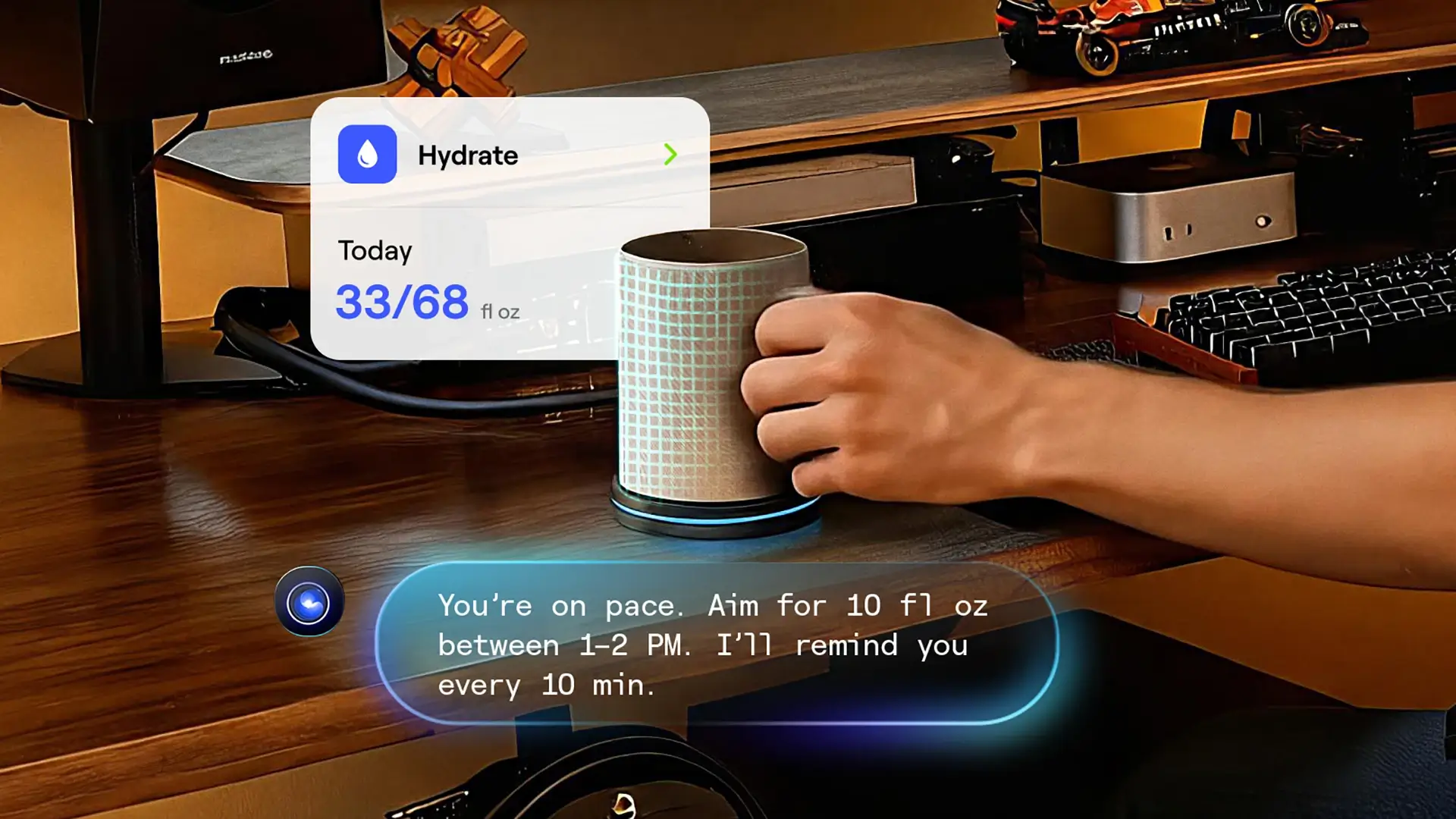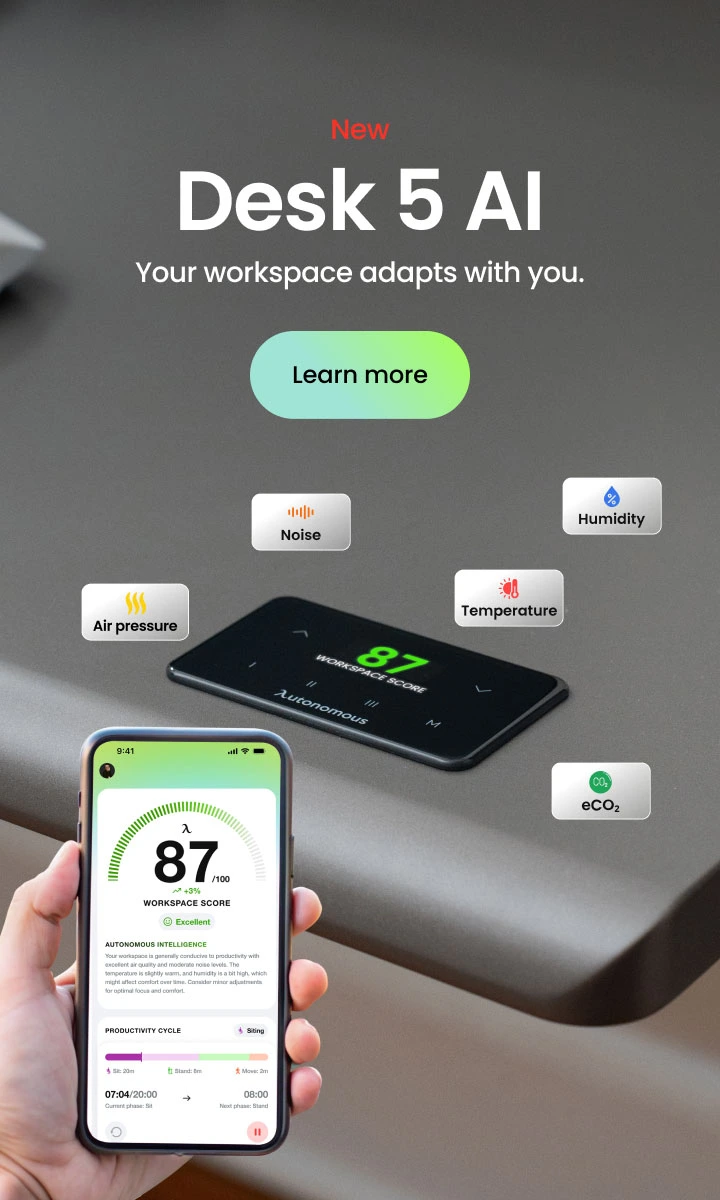
Table of Contents
You've probably heard the advice a thousand times: drink water for clear skin. But does chugging those eight glasses a day actually transform your complexion, or is it just another beauty myth? The truth is more nuanced than a simple yes or no. While water isn't a magic cure for acne or blemishes, proper hydration plays a vital supporting role in skin health.
In this guide, we'll explore the science behind hydration and your skin, set realistic expectations, and show you how to optimize your water intake for a healthier, more radiant complexion. Whether you're dealing with breakouts, dryness, or dullness—and especially if you're struggling to maintain consistent hydration at work—you'll learn practical strategies that actually work.
How Water Affects Your Skin
To understand how drinking water impacts your skin, it’s important to know what your skin needs to stay healthy. As the body’s largest organ, your skin requires proper hydration to perform its vital functions. Drinking enough water is crucial for maintaining its balance and overall health.
1. What Happens To Your Skin When You're Dehydrated
When you don’t drink enough water, your skin shows the effects in various visible ways. Dehydration weakens your skin's natural barrier, which is responsible for retaining moisture and protecting against irritants. Without this protection, your skin becomes more vulnerable to issues like dryness, dullness, and an increased risk of acne.
A lack of hydration also disrupts your skin’s ability to regenerate and repair itself, leaving it looking tired and lackluster. As your skin struggles to maintain moisture, it may overproduce oil to compensate, leading to clogged pores and breakouts. This is why drinking enough water is crucial for a clear complexion and balanced skin.
Here’s how dehydration can affect your skin:
- Dryness and flaking – Your skin struggles to maintain moisture, resulting in tight, uncomfortable sensations and a dull, lackluster appearance
- Emphasized fine lines and wrinkles – Dehydrated skin makes existing lines more pronounced, adding years to your appearance
- Increased sensitivity – A compromised barrier leaves you more susceptible to irritation, redness, and inflammatory responses that can worsen conditions like eczema or rosacea
- Potential breakouts – Paradoxically, dehydrated skin can overproduce oil to compensate, potentially clogging pores

2. How Hydration Supports Skin Health
So, is drink water good for skin? Absolutely—but it works as part of a comprehensive approach rather than a standalone solution. Research published in the Clinical, Cosmetic and Investigational Dermatology journal found that increasing water intake does positively impact skin hydration and biomechanics, particularly in individuals who typically drink less water. However, the effects are gradual and work best when combined with topical hydration and proper skincare.
Here's what proper hydration actually does:
- Supports nutrient delivery:
Water helps transport essential vitamins and minerals to skin cells through your bloodstream. When you drink water for skin health, you're ensuring these nutrients reach where they're needed most.
- Maintains skin elasticity and plumpness:
Well-hydrated skin appears fuller and more supple. This is because water helps maintain turgor—the firmness that comes from cells being adequately filled with fluid. While can drinking water clear your skin completely? Not on its own. But it does contribute to a healthier overall appearance.
- Assists natural detoxification:
Your kidneys and liver handle toxin removal, and they need adequate water to function efficiently. While the idea that "water flushes toxins from skin" is oversimplified, proper hydration does support your body's natural cleansing processes.
- Regulates oil production:
Interestingly, dehydrated skin can sometimes overproduce oil to compensate, potentially leading to breakouts. Maintaining hydration can help balance sebum production, which is why some people wonder can water make your skin clear when dealing with acne.
- Supports overall wellness:
Beyond skin benefits, adequate hydration affects everything from metabolism to energy levels. Water plays a role in various bodily functions, including drink water for weight loss, which can indirectly influence skin health through hormonal balance and reduced inflammation.

Can Drinking Water Clear Acne?
Now that we understand how hydration supports skin health at a cellular level, let's address the most important question: can drinking water clear your skin?
The short answer: No, water alone won't clear your skin—but it's essential for making your other treatments work better.
If you're dealing with acne, blemishes, or dullness, think of water as the foundation. It won't cure acne by itself, but without adequate hydration, even the best skincare products and treatments will underperform. Here's why this matters specifically for acne-prone skin.
What water can do for acne-prone skin:
- Strengthens skin barrier function – Proper hydration helps maintain your skin's protective layer, making it more resistant to bacteria and environmental irritants that worsen breakouts
- Supports natural healing – Adequate water intake helps existing blemishes resolve more efficiently by supporting cellular repair processes
- Balances oil production – Dehydrated skin sometimes overcompensates by producing excess sebum, which can clog pores and trigger breakouts
- Enhances treatment effectiveness – Well-hydrated skin absorbs topical acne treatments better, allowing active ingredients to penetrate more effectively
- Reduces inflammation – Proper hydration may help minimize the inflammatory response that creates red, swollen breakouts

What water cannot do:
- Address hormonal acne – If your breakouts are driven by hormonal imbalances (common around menstrual cycles or due to PCOS), water alone won't solve the root cause
- Unclog existing pores – Water doesn't remove sebum, dead skin cells, or debris already trapped in pores
- Kill acne-causing bacteria – You'll need antibacterial ingredients like benzoyl peroxide or tea tree oil for this
- Replace medical treatment – Severe or cystic acne requires professional intervention, not just increased water intake
- Deliver overnight results – Even with proper hydration, skin cell turnover takes weeks, so patience is essential
Think of hydration as one piece of a larger puzzle. If you're already using effective acne treatments—whether that's salicylic acid, benzoyl peroxide, retinoids, or prescription medications—drinking adequate water can enhance your results by keeping your skin healthy and resilient. But if you're counting on water alone to transform severe acne, you'll likely be disappointed.
How To Drink Water For Maximum Skin Benefits
Knowing how much water to drink is only half the equation. The way you drink water can significantly impact your skin’s health. Building healthy habits around your hydration routine can make a noticeable difference in your skin’s appearance over time. These evidence-based strategies will help you maximize the hydration benefits for your skin.
1. Timing: Spread It Throughout the Day
Don't chug all your water at once—your body can only absorb so much at a time, and the excess gets flushed out without benefiting your skin.
Optimal drinking schedule:
- Morning (upon waking): Start with 16 oz to rehydrate after 7-8 hours without water. This jumpstarts your metabolism and helps flush out toxins that accumulated overnight.
- Before meals: Drink 8-12 oz about 30 minutes before eating. This aids digestion and prevents mistaking thirst for hunger.
- Between meals: Sip consistently throughout the day rather than waiting until you're thirsty. Set hourly reminders if needed.
- During exercise: Add 7-10 oz every 10-20 minutes of activity to replace sweat loss and maintain skin hydration.
- Before bed: Drink 8 oz about an hour before sleep (not right before, to avoid bathroom trips). This helps your skin repair itself overnight.
Consistent hydration throughout the day maintains steady moisture levels in your skin cells. When you drink large amounts sporadically, your body eliminates the excess before your skin can fully benefit—which is why people asking "can drinking water clear your skin" need to understand that consistency matters more than quantity alone.

2. Temperature Considerations
Does water temperature affect your skin results? Research suggests it might influence absorption and circulation.
- Room temperature water (best for most people):
Room temperature water is absorbed more quickly by your body compared to cold water, and it doesn't shock your digestive system. This makes it easier to drink larger quantities throughout the day, which is essential for maintaining consistent hydration levels. For most people focused on drinking water for clear skin, room temperature is the ideal choice for daily hydration.
- Cold water:
While refreshing, cold water may temporarily constrict blood vessels, potentially reducing nutrient delivery to your skin. It can also slow digestion slightly, though your body does burn marginally more calories warming it up. Cold water works best for post-workout hydration when you need quick cooling or during hot weather when you need temperature regulation.
- Warm/hot water:
Warm or hot water can improve circulation and blood flow to your skin, which helps deliver nutrients more effectively. It may also support your body's natural detoxification processes through mild sweating and aids digestion when consumed before meals. This temperature is particularly beneficial for morning hydration to kickstart your system or when you're feeling under the weather
Temperature is just one variable in your hydration strategy. The total amount you consume matters even more, and that depends on your individual body composition, activity level, and environment. If you're still figuring out your baseline needs, our guide on how much water you should drink in a day provides detailed calculations tailored to different lifestyles and circumstances.

3. Enhance With Beneficial Ingredients
Plain water getting boring? These additions make hydration more enjoyable while potentially boosting how effectively you drink water for skin improvements:
Lemon or lime:
- Adds vitamin C (supports collagen production)
- Makes water more palatable, encouraging increased intake
- May help with pH balance
- Add juice from ½ lemon to 16 oz water
Cucumber slices:
- Contains silica (supports skin elasticity)
- Adds subtle flavor and minerals
- Hydrating vegetable that complements your water intake
- Add 5-7 slices per 32 oz water
Mint leaves:
- Refreshing taste without calories or sugar
- Contains antioxidants
- May aid digestion
- Muddle 5-6 leaves in your water bottle
Berries (strawberries, blueberries):
- Pack antioxidants that combat skin-damaging free radicals
- Natural sweetness without added sugar
- Add ½ cup berries to 32 oz water
Ginger slices:
- Anti-inflammatory properties
- May improve circulation to skin
- Adds a spicy kick
- Add 3-4 thin slices per 24 oz water
What to avoid: Sugar-laden flavor packets, artificial sweeteners, and excessive caffeine (which can be dehydrating). These undermine your hydration efforts and won't help you achieve clearer skin.

4. Pair With Water-Rich Foods
Remember, about 20% of your daily fluid intake comes from food. When people ask "does drinking water makes your skin clear," they often forget that eating hydrating foods amplifies the benefits:
Highest water content (90%+ water):
- Cucumbers (96%)
- Lettuce (95%)
- Celery (95%)
- Watermelon (92%)
- Strawberries (91%)
- Cantaloupe (90%)
High water content (80-89% water):
- Grapefruit (88%)
- Peaches (88%)
- Oranges (87%)
- Tomatoes (94%)
- Bell peppers (92%)
- Zucchini (95%)
These foods not only contribute to your hydration but also provide vitamins and antioxidants that support skin health from the inside out—maximizing your results when drinking water to clear skin.
Staying Consistent: Smart Tools For Office Workers
Understanding how much water drink for clear skin and knowing the best practices is one thing—but actually remembering to drink enough throughout a busy workday? That's where most people struggle.
When you enter the deep work flow, hours disappear without a single sip of water. You start your day with good intentions, but by mid-afternoon you realize you've barely had one glass. This sporadic pattern is exactly what prevents people from seeing improvements when trying to drink water for skin health. Remember—your skin needs steady, consistent hydration throughout the day to maintain barrier function and achieve that clearer complexion. Chugging water sporadically doesn't work; your body eliminates the excess before your skin can benefit.
This is where Hydrate AI from Autonomous becomes valuable. It's an AI-powered hydration assistant designed specifically for desk workers who struggle with consistency. Instead of relying on willpower or generic phone alarms, this water tracker for bottle creates an intelligent reminder system that adapts to your work patterns and prompts you at optimal times—between meetings, during natural breaks, and when you're most likely to forget.
Key features:
- Personalized AI reminders that learn your schedule and adapt to your drinking patterns
- Progress tracking so you can monitor if you're meeting daily targets for skin health
- Desk-friendly design that integrates seamlessly into your workspace
- No app required making it effortless to use without phone distractions
Beyond smart reminders, your physical desk setup matters too. Keep your water bottle within arm's reach, consider a coaster to protect your desk surface, and ensure you have easy access to filtered water or a water cooler. Small changes to your workspace—from the right office accessories to an organized desk layout—remove friction and make consistent hydration effortless rather than something you have to consciously remember.
FAQs
Does drinking water clear your skin?
Drinking water helps improve skin clarity by maintaining hydration, supporting barrier function, and enhancing overall skin health, but it won't clear skin on its own. Water works best as part of a comprehensive approach that includes proper skincare, good nutrition, and addressing specific skin concerns with targeted treatments.
How long does it take for drinking water to clear skin?
You can notice improved skin hydration and texture within 1-2 weeks of consistent water intake, but significant clarity improvements typically take 4-6 weeks. This timeline aligns with your skin's natural cell turnover cycle, which is why patience and consistency are essential when drinking water for skin benefits.
How much water should I drink for clear skin?
Most adults need 8-12 cups (64-96 oz) of water daily for optimal skin health, though individual needs vary based on weight, activity level, and climate. A practical guideline is drinking half your body weight in ounces—so if you weigh 150 lbs, aim for 75 oz daily.

Can drinking water help acne?
Drinking water can help reduce acne by maintaining skin barrier function, balancing oil production, and supporting your body's natural healing processes, but it won't eliminate acne alone. Water works best when combined with effective acne treatments like salicylic acid, benzoyl peroxide, or prescription medications for moderate to severe cases.
Will drinking water make my skin glow?
Yes, proper hydration can give your skin a natural glow within 1-2 weeks by improving blood circulation and helping skin cells appear more plumped and light-reflective. However, this glow effect is most noticeable when you're consistently hydrated and using a good skincare routine.
When is the best time to drink water for clear skin?
Spread water intake throughout the day rather than drinking large amounts at once—start with 16 oz upon waking, sip 8-12 oz before meals, and drink consistently between meals. This steady hydration pattern maintains optimal moisture levels in skin cells better than sporadic large intakes that your body simply eliminates
Can drinking water help reduce wrinkles?
Drinking water can minimize the appearance of fine lines by keeping skin plumped and hydrated, but it won't eliminate deep wrinkles or prevent new ones. For wrinkle prevention and reduction, you need sunscreen, retinoids, and other targeted anti-aging treatments in addition to proper hydration.
What type of water is best for drinking for clear skin?
Room temperature water is best for skin health because it's absorbed more quickly than cold water and doesn't shock your digestive system.
Does drinking water help acne scars?
Proper hydration supports collagen production and skin healing, which may improve the appearance of acne scars over time, but water alone won't significantly fade scarring.
.webp)
Conclusion
So, can drinking water clear your skin? The answer is nuanced: water is an essential foundation for healthy, clear skin, but it's not a magic cure that works alone. When you consistently drink water for clear skin—aiming for 8-12 cups daily—you're supporting your skin's barrier function, maintaining hydration, and creating optimal conditions for your complexion to thrive.
However, the real results come when you combine proper hydration with a solid skincare routine, balanced nutrition, and targeted treatments for specific concerns. Stay healthy at work also plays a part in supporting your overall wellness, which reflects directly on your skin.
Remember, meaningful skin improvements take 4-6 weeks of consistent effort. If you're struggling with persistent acne, severe dryness, or other stubborn skin issues, don't hesitate to consult a dermatologist. Professional guidance combined with good hydration habits will give you the best chance of achieving the clear, glowing skin you're working toward. Start today by filling up that water bottle—your skin will thank you for it.
Spread the word
.svg)









